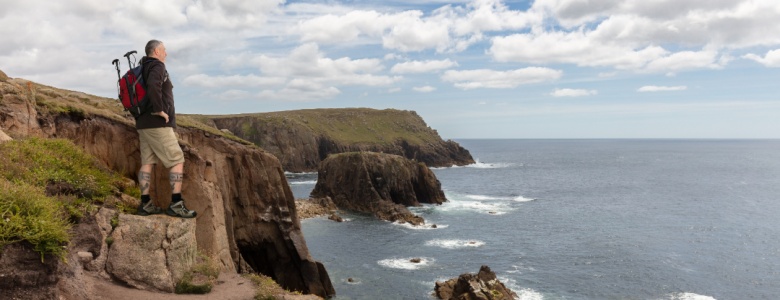
Bestselling author David Nicholls is enjoying huge success currently, thanks to the Netflix adaptation of his novel One Day. But it’s his latest book, You Are Here (released to huge critical acclaim in April), that taps into his love of solo walking.
At HA&W, we’re no strangers to a long-distance hike either. We’ve been completing charity fundraising challenges for more than 20 years, tackling the Offa’s Dyke Path, the Pembrokeshire Way, and the journey from Land’s End to John O’Groats, among others.
We understand the health and wellbeing benefits of time spent walking in nature, whether in a group or alone.
To celebrate May’s National Walking Month, keep reading for three surprising health and wellbeing benefits of a solo hike, as demonstrated by those who know best.
1. Long walks in nature might not solve all your problems but they do provide time to reflect
Writing in the Guardian recently, Nicholls spoke about his love of solo walking, and of days spent “either in silence or muttering to myself about the rain”.
Aware of the reported mental health benefits of hiking, Nicholls also notes that he felt “profoundly unhappy in places of extraordinary beauty”, concluding that it’s “too much to expect happiness solely from a view”.
Nicholls uses annual solo treks as a means to get out of the city. We all have busy lives from which to escape, if only for a few hours, and being alone with your thoughts can provide a change of perspective, helping you to clear your head and confront challenges. Nicholl’s first hike, for example, took place in the months following the death of his father.
The beauty of nature can be restorative, but you’ll know your own mind and what works for you. If you need to talk, opt for a walk with a friend. In March, as part of your rundown of five of the UK’s best active retreats for 2024, we wrote about Mind Over Mountains.
The charity offers regular weekend retreats combining beautiful walks, mindfulness, and access to professional counsellors. You can find out more about Mind Over Mountains here.
2. Time alone can help us to regain perspective on those things we should be grateful for
Nicholls isn’t the only author to take solace in hiking. Current poet laureate Simon Armitage has released two books on long-distance travel. Walking Home and Walking Away follow his solo journeys along the Pennine Way and South West Coast Path, respectively.
Each night, Armitage performed a poetry reading at a local pub, village hall, or living room. The next morning, he set off again on his “solo” hike, invariably accompanied by hangers-on who “dropped off” as the day progressed.
Walking alone can provide a perfect opportunity to think about the things you’re grateful for, which can have huge emotional and physical wellbeing benefits. The mindfulness, meditation, and sleep app Calm recently listed some of them, and found that keeping a gratitude journal can (among other things):
- Boost happiness
- Reduce stress
- Improve sleep
- Build resilience
- Strengthen relationships.
On Armitage’s soggy south coast hike, he often longed for the quiet solitude of solo walking, only to find himself grateful for company when it arrived. No more so than on the night of 30 August 2013, just four days into his trip, when the headlights outside a B&B signalled the arrival of his wife.
The “unscheduled visit” and “mercy dash” came after Armitage was notified earlier in the day of the death of fellow poet and friend, the Nobel laureate Seamus Heaney.
3. Walking at your own pace, stopping when you want to, might mean you see more
When walking in a group, you might be the type who always takes the lead, forced to stop every few miles as those behind catch up.
Equally, you could be more at home bringing up the rear. Forever feeling guilty about slowing people down, you’re forced to do without sufficient breaks, arriving at each rest stop just as the time comes to move on.
Solo hiking means walking at a speed that suits you and dictating when you stop. Whether you want the physical challenge of a quick ascent or the emotional detox of a slow meander in nature, you decide. If you’re a keen photographer, you might see a particular plant, bird, or view that catches your eye. Maybe a certain spot looks perfect for sitting and being mindful.
You have complete freedom over your pace, but also over where you go and when. Another writer and solo-travel enthusiast, Robert MacFarlane, wrote in his bestselling book The Old Ways about a nighttime walk in winter.
Following animal tracks in the snow along the remains of an ancient Roman road, MacFarlane finds himself sipping whiskey on the 1st green of Scotland’s most exclusive golf course.
For him, walking is about looking inward, about the “relationship between paths, walking, and the imagination”, and about following trails simply “to see where they might lead”. It’s a noble pursuit and one you might opt to undertake solo this National Walking Month.
Read a rundown of five UK walking routes perfect for a summer staycation if you need inspiration.


